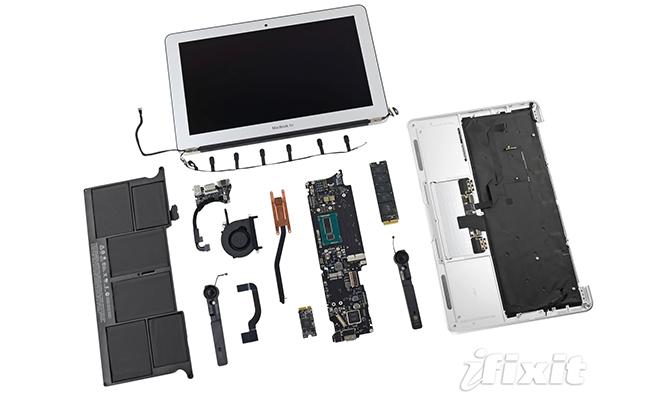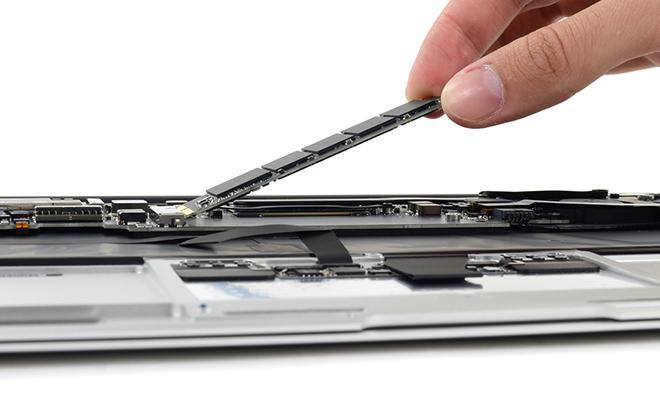The 11-inch version of Apple's new MacBook Air has gotten its requisite disassembly, with the process revealing some of the craft that went into getting it its longer battery life, including a tweaked design to accommodate a slightly larger battery.
The new 11-inch Air, like the new 13-inch Air, features a smaller SSD module and a new heat sink clamp, iFixit found in the course of its teardown. The ultralight notebook also features an improved battery outputting at 7.6V with 5100mAh.
The new battery weighs 8.08 oz and is rated at 38.75 watt-hours, an improvement over last year's model, which weighed 7.9 oz and was rated at 35 watt-hours. Last year's model was capable of up to five hours of battery life, while the new model can give up to 9 hours of operation.
The battery, though, isn't the main reason behind the new MacBook Airs' longevity. Much of the credit for that goes to Intel's new line of power-sipping processors. Intel said the Haswell line would enable up to 50 percent longer battery life in notebooks, and those claims appear to have been largely borne out in Apple's new notebooks.
Additionally, the new 11-inch Air sports an updated SSD module. Unlike the Samsung-supplied unit in the 13-inch version, though, the 11-inch unit has a SanDisk module containing a Marvell PCIe SSD controller and 2GB of DDR3 SDRAM from Samsung.
Comparison of 2012 11-inch MacBook Air (top) with 2013 model (middle) and the 2013 13-inch model (bottom). | Source: iFixitAs with the 13-inch model, the only real difference in the chassis of the new 11-inch model is the addition of a second hole for the dual-microphone array.
Overall, iFiixit gives the 11-inch MacBook air the same poor repairability score as its larger sibling. Giving the new Air a 4 out of a possible 10 for repairability, iFixit pointed to the device's proprietary Pentalobe screws, as well as the soldered-in RAM and non-upgradeable components.
iFixit has for some time been handing out low scores to Apple's products. Devices like the new iMac and the Retina MacBook Pro have gotten thinner and lighter due in part to Apple's reliance on glued- or soldered-in components, which makes upgrading the devices a daunting task at best and typically requires that their repair be left to a professional.
 Kevin Bostic
Kevin Bostic








-m.jpg)






 Charles Martin
Charles Martin
 Malcolm Owen
Malcolm Owen
 William Gallagher
William Gallagher

 Christine McKee
Christine McKee
 Wesley Hilliard
Wesley Hilliard

 Andrew Orr
Andrew Orr







21 Comments
Deja Vu
Any HD5000 benchmarks out yet?
Also, would be nice if Apple could produce something with a decent ifixit score. I understand most of Apple customers dont want to open there toy, but its still usefull for the afterlife of the products, once they are sold used and the customer upgrades to a new toy.
BEWARE:
If the 50% increase came from Haswell, that would make it 7.5 hours. The lightly heavier battery and more powerful watts per hour can't possible make up for the other 1.5 hour. Can we therefore presume they've optimised OSX for this laptop model, and if so, will 10.9 carry this over to their other laptops?
[quote name="herbapou" url="/t/158052/teardown-of-apples-new-11-macbook-air-finds-smaller-ssd-module-tweaked-battery#post_2346251"]Any HD5000 benchmarks out yet? Also, would be nice if Apple could produce something with a decent ifixit score. I understand most of Apple customers dont want to open there toy, but its still usefull for the afterlife of the products, once they are sold used and the customer upgrades to a new toy. [/quote] Nonsense. iFixit scores are irrelevant. Any reputable repair shop can easily acquire pentalobe screw drivers. Why in the world would that be a problem? More importantly, it ignores the tradeoffs inherent in design. For example, soldered RAM is more reliable than socketed RAM. By switching to soldered RAM, Apple has made the system less likely to need repair - even though it's harder to fix. Which would you rather have? A system with one chance in a thousand of failure with a $100 cost to repair or a system with one chance in a hundred of failure but a $50 cost to repair? iFixit scores don't address that issue - and are likely to lead to the wrong choice.